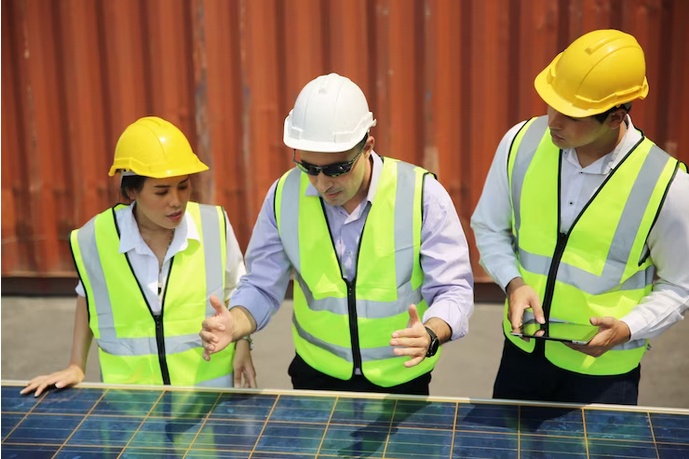Introduction
The rapid growth of solar energy adoption has led to the widespread installation of solar panels, both on residential rooftops and in large-scale solar farms. While solar panels have a long operational life, they eventually reach a point where they need to be decommissioned and replaced. This article explores the economics of solar panel decommissioning, shedding light on the costs and benefits associated with the end-of-life phase of solar panels.
Understanding Solar Panel Decommissioning
Solar panels, also known as photovoltaic (PV) panels, have an operational life typically ranging from 25 to 30 years. Over time, these panels may experience reduced efficiency or suffer physical damage. When solar panels are no longer economically viable, they must be decommissioned, which involves taking them out of service, safely disposing of or recycling the materials, and replacing them with new panels.
The Costs of Solar Panel Decommissioning
-
Removal and Transportation Costs:
- Decommissioning begins with the removal of solar panels from their mounting structures. This process can be labor-intensive, especially for large-scale solar farms.
- Transportation costs are associated with moving the decommissioned panels from their installation site to a recycling or disposal facility. The distance, logistics, and the condition of the panels can impact transportation costs.
-
Recycling and Disposal Costs:
- Solar panels contain various materials, including glass, aluminum, silicon, and potentially hazardous substances. Recycling or disposing of these materials properly comes with associated costs.
- Recycling costs are generally higher but contribute to resource conservation. Disposal costs are often lower but can be associated with environmental concerns if not managed carefully.
-
Replacement Costs:
- Replacing decommissioned solar panels with new ones involves the purchase of new equipment and, in some cases, installation costs.
- The type of panels chosen, as well as the installation scale, can significantly affect replacement costs.
-
Labor Costs:
- Labor costs are associated with the workforce required for the decommissioning process, including removal, transportation, and installation of new panels.
- Labor costs can vary based on location and the size of the solar installation.
The Benefits of Solar Panel Decommissioning
-
Improved Efficiency:
- The replacement of aging solar panels with newer, more efficient ones can result in increased energy production.
- Improved efficiency translates to higher energy generation and, subsequently, increased revenues.
-
Environmental Benefits:
- Proper decommissioning practices, including recycling, contribute to environmental benefits by reducing waste and conserving resources.
- Recycling panels prevents the release of hazardous materials into the environment, further enhancing the environmental impact.
-
Economic Benefits:
- The decommissioning process, when carried out efficiently, can lead to cost savings. Recycling panels allows for the recovery of valuable materials, which can offset the costs of decommissioning.
- Improved energy generation from new panels results in increased revenue over the panels' operational life.
-
Compliance and Reputation:
- Proper decommissioning practices ensure compliance with environmental regulations, avoiding potential legal consequences and penalties.
- A commitment to responsible decommissioning can enhance the reputation of solar energy operators and attract environmentally conscious customers.
Factors Influencing the Economics of Solar Panel Decommissioning
-
Age and Condition of Panels:
- The age and condition of solar panels significantly influence the economics of decommissioning. Older panels with diminished efficiency may make decommissioning more cost-effective.
-
Location and Scale:
- The scale of the solar installation and its location can impact the costs of decommissioning. Large-scale installations often involve higher transportation and labor costs.
-
Energy Prices:
- The current and projected energy prices can affect the economic feasibility of decommissioning and replacing solar panels. Higher energy prices may justify the investment in newer, more efficient panels.
-
Recycling Infrastructure:
- The availability of nearby recycling facilities can affect the decision to recycle panels. Areas with well-established recycling infrastructure may find recycling more economically viable.
Challenges and Considerations
-
Environmental Impact:
- While recycling panels offers environmental benefits, the recycling process itself can have environmental consequences. It's essential to choose recycling methods that minimize these impacts.
-
Regulatory Compliance:
- Solar panel decommissioning is subject to various environmental regulations. Ensuring compliance with these regulations is crucial to avoid legal issues.
-
Cost-Benefit Analysis:
- Solar energy operators and stakeholders must conduct a thorough cost-benefit analysis to determine the optimal time for decommissioning and replacement. This analysis should consider factors such as energy prices, panel condition, and replacement costs.
Conclusion
The economics of solar panel decommissioning are influenced by a complex interplay of costs and benefits. Decommissioning older or damaged panels comes with costs related to removal, transportation, recycling or disposal, replacement, and labor. However, the benefits of decommissioning, such as improved efficiency, environmental benefits, and cost savings through recycling, often outweigh these costs.
Several factors, including the age and condition of panels, location, energy prices, and recycling infrastructure, influence the economic feasibility of decommissioning. Proper planning, cost-benefit analysis, and adherence to environmental regulations are essential to ensure that the decommissioning process is both economically and environmentally responsible.
As the solar energy industry continues to grow and evolve, understanding the economics of solar panel decommissioning is critical for operators and stakeholders to make informed decisions that contribute to both economic prosperity and environmental sustainability. By carefully considering the costs and benefits, the solar industry can continue to advance as a cleaner and more efficient source of renewable energy.


No comments yet